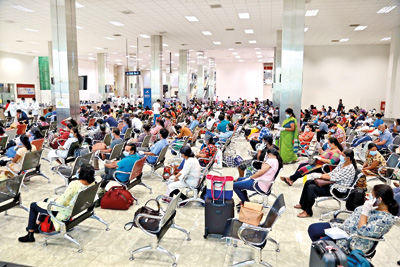News
Desperate to come home
The number of Sri Lankans perishing of COVID-19 in West Asia has risen to 44 with many of them residents of Saudi Arabia.

Repatriated migrant workers on arrival at the BIA. Pic by T.K.G. Kapila
There are no flights in the near future to repatriate Sri Lankans from any countries abroad. They were suspended on July 14 after the eruption of the Kandakadu cluster and there is no plan to resume them in the coming days, authoritative sources said, adding that the President’s Office will review the decision first.
One Sri Lankan was reported dead in Abu Dhabi and seven in Dubai, said R K K M P Randeniya, Deputy General Manager, Sri Lanka Bureau of Foreign Employment (SLBFE). Four died in Jordan, nine in Kuwait and two each in Oman and Qatar. The highest was in Saudi Arabia, with 19 (14 of them in Riyadh) victims.
In keeping with global health requirements, the bodies of the deceased were disposed of in the respective countries. They will receive insurance payouts from the SLBFE as well as an allowance for religious and cultural ceremonies carried out in the name of their loved ones.
There are an estimated 1,700 Sri Lankan workers abroad still infected with the coronavirus, Mr Randeniya said, citing statistics received as at Friday morning.
Labour attaches in various embassies are working with Heads of Missions to push Governments for visa renewals so that workers can stay on till they are repatriated or the situation improves. Such negotiations resulted this week in Abu Dhabi agreeing to extend the validity of certain visas till September. Meanwhile, the Kuwait Government could declare another Amnesty next month that would help illegal workers.
Around 38,000 are still waiting to return, based on registration numbers. Thousands have lost jobs and are living hand-to-mouth, worker representatives said, adding that families in Sri Lanka are scraping funds to send to their relatives abroad when it was the other way around before the pandemic.
“It’s four months now without a job,” said Tharanga Y Lakshan, who was a hotel worker in Saudi Arabia. He was laid off with four others in March. “We have barely enough money to eat. Luckily we are still living in an apartment rented for us by our former company but the lease will expire soon and it will not be renewed. We don’t know when we will be turned out from here.”
“The money we earned is exhausted,” he continued. “We registered at the Embassy to return to Sri Lanka three months ago. But it doesn’t look like we will even be put on the second flight. They said our names have been dropped and we will have to register again. That means we will have to go to the bottom of the list. There is no proper process at the Embassy.”
Of those who qualify, many cannot afford the 1,200 riyals (around Rs 60,000) needed to carry out a mandatory PCR test before leaving for home. The airplane ticket is around 2,200 riyals (Rs 110,000).
Lakshan, 28, is from Galle and has worked in Saudi for two-and-a-half years. His earnings supported his mother, father and two younger brothers.
“How can a man who fell from the frying pan into the fire afford 1,200 riyals for a PCR test?” Tharanga asked. And yet, he said, everyone wants to come home. But Sri Lanka sent only one flight to Saudi Arabia which had hundreds of migrant workers.
“Don’t ask me how many deaths there have been,” he said dejectedly. “My head is hurting from reading those things. That’s how mentally affected I am.”
Many are now scared because the COVID-19 deaths are increasing, worker representatives said. Of the Sri Lankans who passed away in Saudi Arabia, many had underlying health conditions like diabetes and asthma. One domestic worker died (the family she worked for was also infected) but she was the only female. The others were men.
Domestic workers are better off than others as they continue to have work which includes food and lodging. However, large numbers with employment visas and did odd jobs in various places and now in dire straits. After their papers expire, they need to leave the country and re-enter on fresh visas. But, owing to the pandemic, they are trapped, posing a dilemma also to the host nation.
“Hi,” read one desperate email seen by the Sunday Times. “Waiting for a flight from Saudi Arabia to return to Sri Lanka. Kindly let me know when is the next flight. I don’t have salary and food for 4 months. My family is starving without food. Please help me.”

